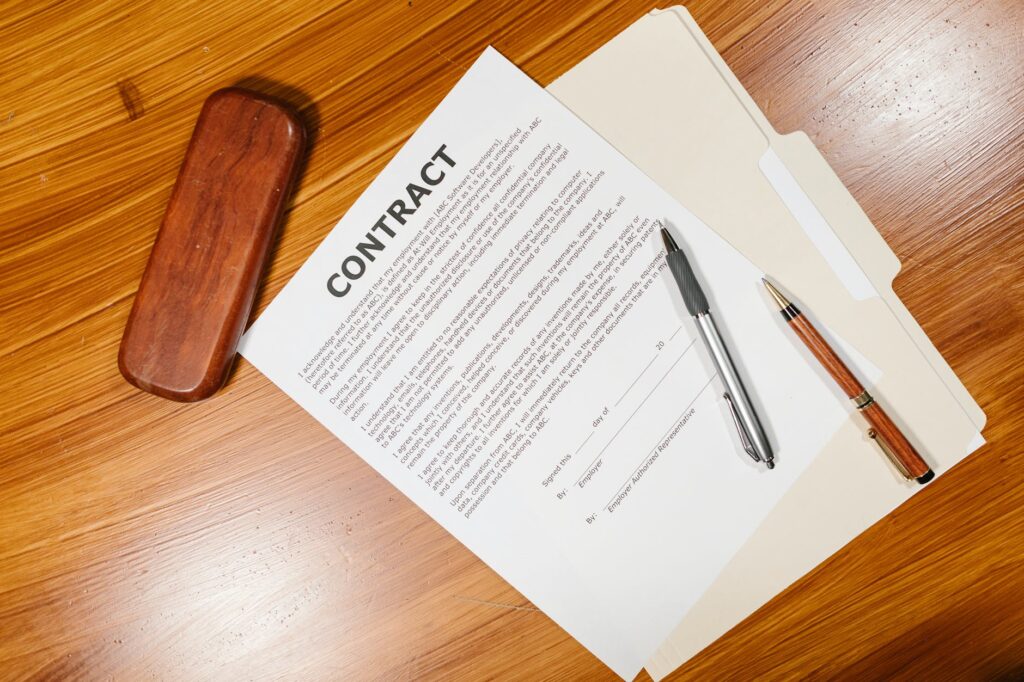
Tips for Negotiating a Commercial Lease
Negotiating a commercial lease is an important step to secure premises on terms that meet your business needs and your budget. Effective negotiation can help you avoid costly mistakes and
A “Time is of the essence clause is frequently used in commercial contracts. This term emphasises the importance of timely execution of contractual duties and minimises potential delays.
Whether you’re a business owner, a legal professional, or simply interested in understanding the nuances of commercial law, this blog provides valuable insights into the importance of timing clauses within contracts.
In this article, our contract lawyer will explore the legal implications of a time is of the essence clause, its role in commercial contracts, and how it can influence the outcomes of contractual disputes.

In commercial contracts, the term “time is of the essence” is a legal phrase that provides the importance of adhering to the time stipulations set out in the contract. When this phrase is included in a contract, the parties must comply with their contractual obligations within the specified timeframes.
However, time is of the essence may be expressly or impliedly written in a contract. Here are examples of express and implied time is of the essence clause in a contract.
In commercial contracts, time is of the essence is often expressly stated in situations where the timely performance of obligations is critical. This could include contracts for the sale of goods, delivery of services, construction projects, or real estate transactions, among others.
An example of a clause where ‘time is of the essence’ is expressly stated could be:
“Time is of the Essence: The parties hereby agree that time is of the essence with respect to the performance of the obligations herein. Failure to perform any obligation by the date specified in this agreement will be considered a material breach of this contract.”
Moreover, even when not expressly stated, ‘time is of the essence’ can be implied in a contract based on the nature of the agreement and the conduct of the parties. This typically occurs in situations where the timely performance of obligations is crucial to the value or purpose of the contract.
For instance, in contracts related to perishable goods, it could be implied that ‘time is of the essence’ because any delay in delivery could render the goods worthless. Similarly, in contracts for the sale of property, if a buyer needs to take possession by a certain date to avoid incurring additional costs, it could be implied that ‘time is of the essence’.
A sample clause where ‘time is of the essence’ might be implied could be:
“Delivery: The Seller shall deliver the Goods to the Buyer at the location specified in the contract on the agreed delivery date. The Buyer acknowledges that prompt delivery is crucial to its business operations.”
Failure to comply with a “Time is of the essence” clause can be considered a breach of the contract, giving the non-breaching party the right to seek remedies, which could include terminating the contract or seeking damages. This is because the clause imposes strict time requirements for the performance of contractual obligations.
Examples of the consequences could be:
Such failures can have detrimental effects, especially on your financial standing and business relationships. Additionally, it could harm your business reputation, making it difficult to secure future contracts or partnerships.
It is important to note, however, that the specific consequences of a breach will depend on the terms of the contract and the applicable law. The courts may consider various factors, such as the nature of the contract, the relationship between the time stipulation and other terms of the contract, and the specific language used in the contract, when determining the consequences of a breach.
Therefore, it’s advisable to seek independent legal advice if you’re unable to comply with a ‘time is of the essence’ clause to be well-assisted with your matter.

Enforcing a ‘time is of the essence’ clause in case of a breach under Australian legislation typically involves legal action. If a party fails to meet the deadlines stipulated in the contract, it can be considered a breach of contract. The non-breaching party may take the following steps:
The first step is usually to issue a notice to the breaching party, outlining the nature of the breach and requesting them to rectify it within a specified timeframe.
If the breaching party fails to rectify the breach within the specified timeframe, the non-breaching party can seek legal remedies. This could include terminating the contract or seeking damages. The specific remedies available will depend on the terms of the contract and the applicable law.
If the dispute cannot be resolved, the non-breaching party may need to commence legal proceedings. This could involve filing a claim in a court or, if the contract provides for it, initiating arbitration or mediation.
When drafting a ‘time is of the essence’ clause, it’s crucial to use clear and precise language. The clause should explicitly state which obligations are subject to the clause, the specific timeframes for performance, and the consequences of any delays. Otherwise, ambiguity can lead to disputes and legal uncertainty, so it’s important to ensure that the clause accurately reflects the parties’ intentions.
Before including a ‘time is of the essence’ clause, consider the implications for both parties. This clause imposes strict time requirements and can lead to severe consequences in the event of a delay, including the right for the non-breaching party to terminate the contract or seek damages. Therefore, ensure that the parties are capable of meeting the time requirements and understand the potential consequences.
Given the significant impact of ‘time is of the essence’ clauses on the rights and obligations of the parties, it’s advisable to seek legal advice when drafting or entering into a contract that includes such a clause. Further, a contract lawyer can provide guidance on the appropriate use of the clause. They will take into account the specific circumstances and the applicable law.
They can also help to ensure that the clause is appropriately drafted and that the parties understand the implications of making time of the essence.
Learn more about how to write a contract in our other article.

The term “time is of the essence” requires that punctual fulfillment of obligations is a crucial element of a contract. Consequently, any delay in performance can be considered a significant violation of the contract, granting the other party the right to seek remedies for the breach.
A ‘time is of the essence’ clause may not be necessary in every contract. It is most relevant when there are specific deadlines that both parties must adhere to. If one party doesn’t have any set deadlines and can fulfill their contractual obligations at their own pace, then this clause may not be applicable. Including it could potentially restrict that party’s flexibility unnecessarily.
While it’s not legally required to have a lawyer draft or help you understand a ‘time is of the essence’ clause in a commercial contract in Australia, it’s highly recommended. This clause can have significant impacts on the rights and obligations of the parties involved, and its interpretation can be complex.
A lawyer can provide valuable guidance on the appropriate use of the clause, taking into account the specific circumstances and the applicable law. They can also help to ensure that the clause is appropriately drafted and that you fully understand its implications.
Further, when a dispute arises, a lawyer can also provide advice on the enforcement of the clause and the potential remedies available. Therefore, seeking legal advice can help to protect your interests and reduce the risk of potential disputes.
Contact us for a free consultation
We provide legal advice to business and individuals across Australia, no matter which State or Territory you are located. Our easy-to-access, online legal services mean that you can talk to our lawyers wherever you are, at a time that suits you.
4.8
Google Reviews

Don’t hesitate – reach out for your free legal assistance today. Your peace of mind is just a click or call away!

Negotiating a commercial lease is an important step to secure premises on terms that meet your business needs and your budget. Effective negotiation can help you avoid costly mistakes and

Leasing business premises is a significant financial commitment for businesses. Businesses premises leases are usually lengthy legal documents that need to be properly negotiated and understood. This article is written

When individuals come together to form a company and become shareholders, it’s essential to establish a clear framework that governs their rights and responsibilities. This is where a shareholder agreement